Event Management: Recent Developments and Strategies Report
VerifiedAdded on 2019/12/17
|9
|2262
|223
Report
AI Summary
This report provides a comprehensive overview of event management, encompassing recent developments, promotion tools, and the event lifecycle. It examines the evolution of the event management sector, highlighting shifts from logistic to business value, the impact of mobile and social media, and the importance of green meetings and technology. The report details various promotion tools, including networking, advertising, business cards, direct email, internet marketing, and customer service. It also outlines the stages of the event lifecycle, from defining goals and objectives to marketing and evaluation. Furthermore, the report presents a case study of an event for Coca-Cola, discussing location selection, budget considerations, and promotional strategies. The report concludes by emphasizing the growth of the event management industry and the effective use of resources to achieve event goals. The report is a useful resource for students seeking an understanding of event management principles and practices.
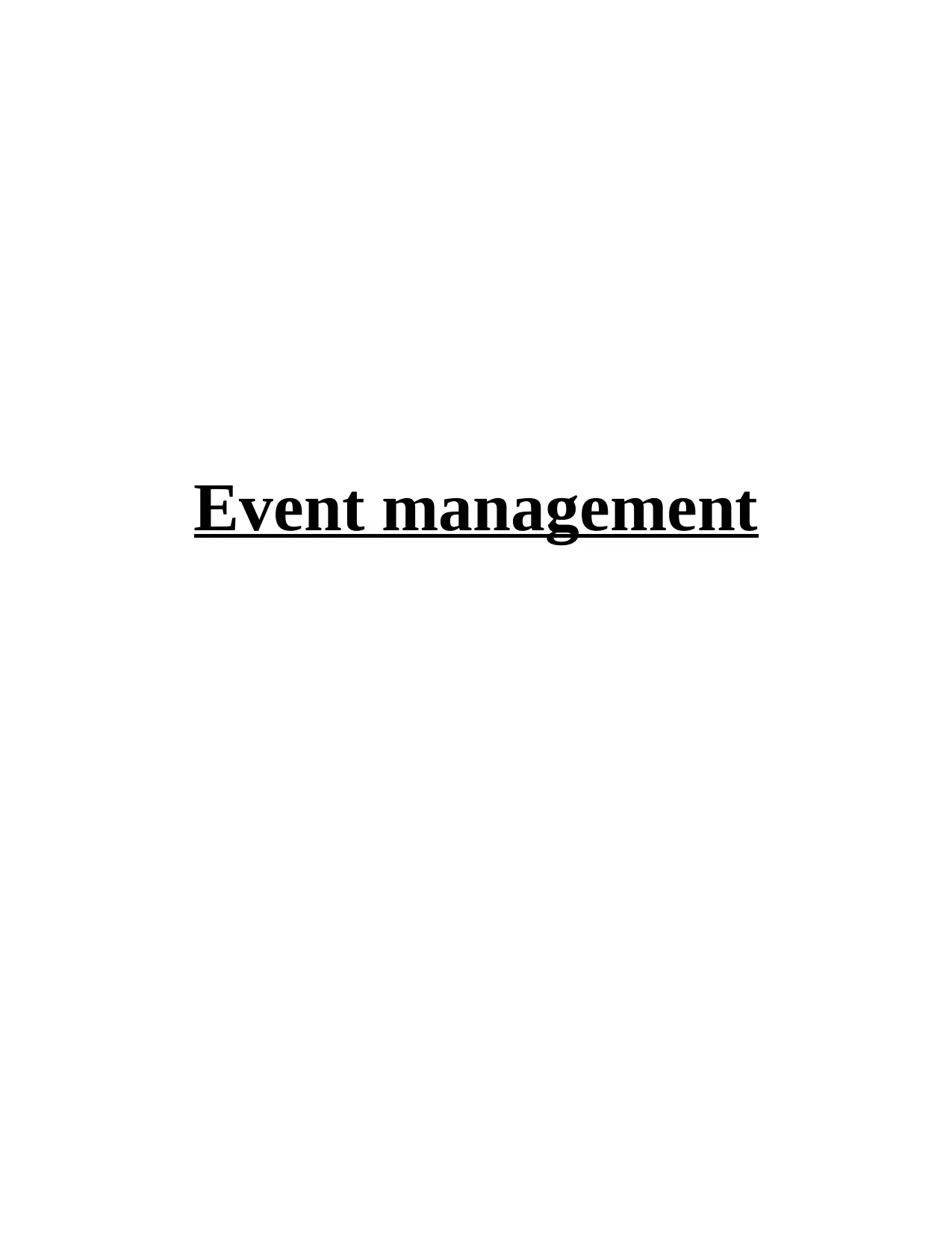
Event management
Paraphrase This Document
Need a fresh take? Get an instant paraphrase of this document with our AI Paraphraser
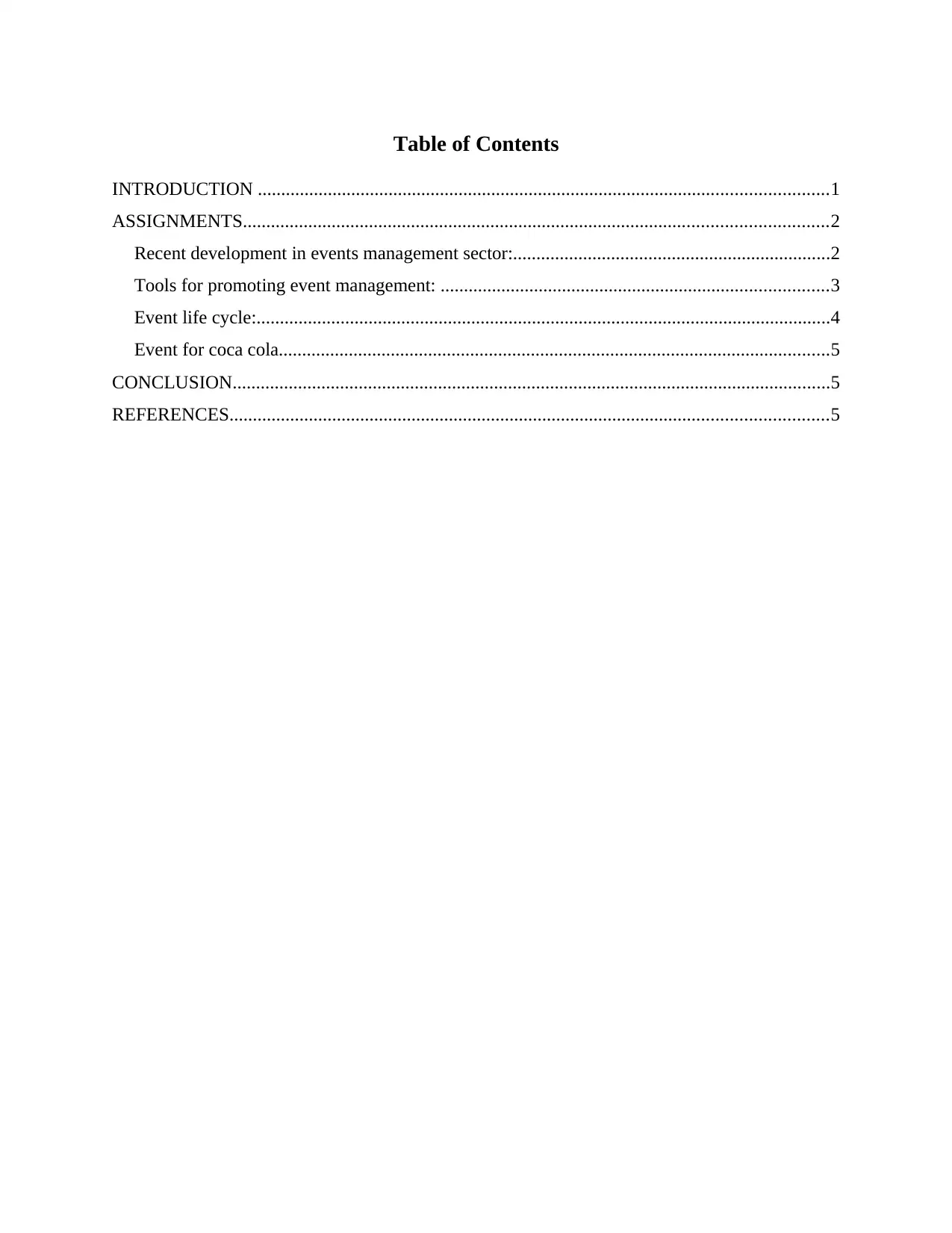
Table of Contents
INTRODUCTION ..........................................................................................................................1
ASSIGNMENTS.............................................................................................................................2
Recent development in events management sector:....................................................................2
Tools for promoting event management: ...................................................................................3
Event life cycle:...........................................................................................................................4
Event for coca cola......................................................................................................................5
CONCLUSION................................................................................................................................5
REFERENCES................................................................................................................................5
INTRODUCTION ..........................................................................................................................1
ASSIGNMENTS.............................................................................................................................2
Recent development in events management sector:....................................................................2
Tools for promoting event management: ...................................................................................3
Event life cycle:...........................................................................................................................4
Event for coca cola......................................................................................................................5
CONCLUSION................................................................................................................................5
REFERENCES................................................................................................................................5
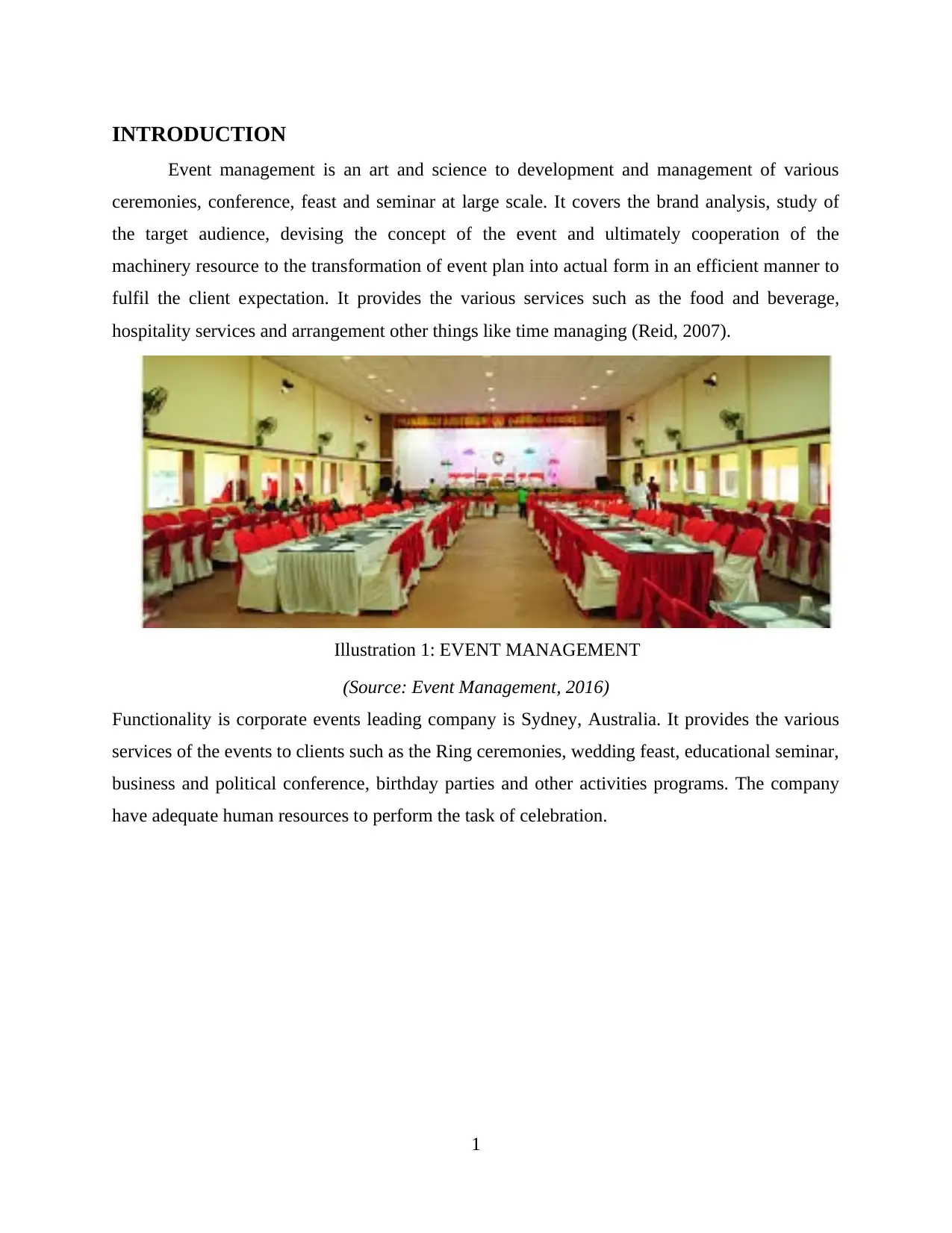
INTRODUCTION
Event management is an art and science to development and management of various
ceremonies, conference, feast and seminar at large scale. It covers the brand analysis, study of
the target audience, devising the concept of the event and ultimately cooperation of the
machinery resource to the transformation of event plan into actual form in an efficient manner to
fulfil the client expectation. It provides the various services such as the food and beverage,
hospitality services and arrangement other things like time managing (Reid, 2007).
(Source: Event Management, 2016)
Functionality is corporate events leading company is Sydney, Australia. It provides the various
services of the events to clients such as the Ring ceremonies, wedding feast, educational seminar,
business and political conference, birthday parties and other activities programs. The company
have adequate human resources to perform the task of celebration.
1
Illustration 1: EVENT MANAGEMENT
Event management is an art and science to development and management of various
ceremonies, conference, feast and seminar at large scale. It covers the brand analysis, study of
the target audience, devising the concept of the event and ultimately cooperation of the
machinery resource to the transformation of event plan into actual form in an efficient manner to
fulfil the client expectation. It provides the various services such as the food and beverage,
hospitality services and arrangement other things like time managing (Reid, 2007).
(Source: Event Management, 2016)
Functionality is corporate events leading company is Sydney, Australia. It provides the various
services of the events to clients such as the Ring ceremonies, wedding feast, educational seminar,
business and political conference, birthday parties and other activities programs. The company
have adequate human resources to perform the task of celebration.
1
Illustration 1: EVENT MANAGEMENT
⊘ This is a preview!⊘
Do you want full access?
Subscribe today to unlock all pages.

Trusted by 1+ million students worldwide
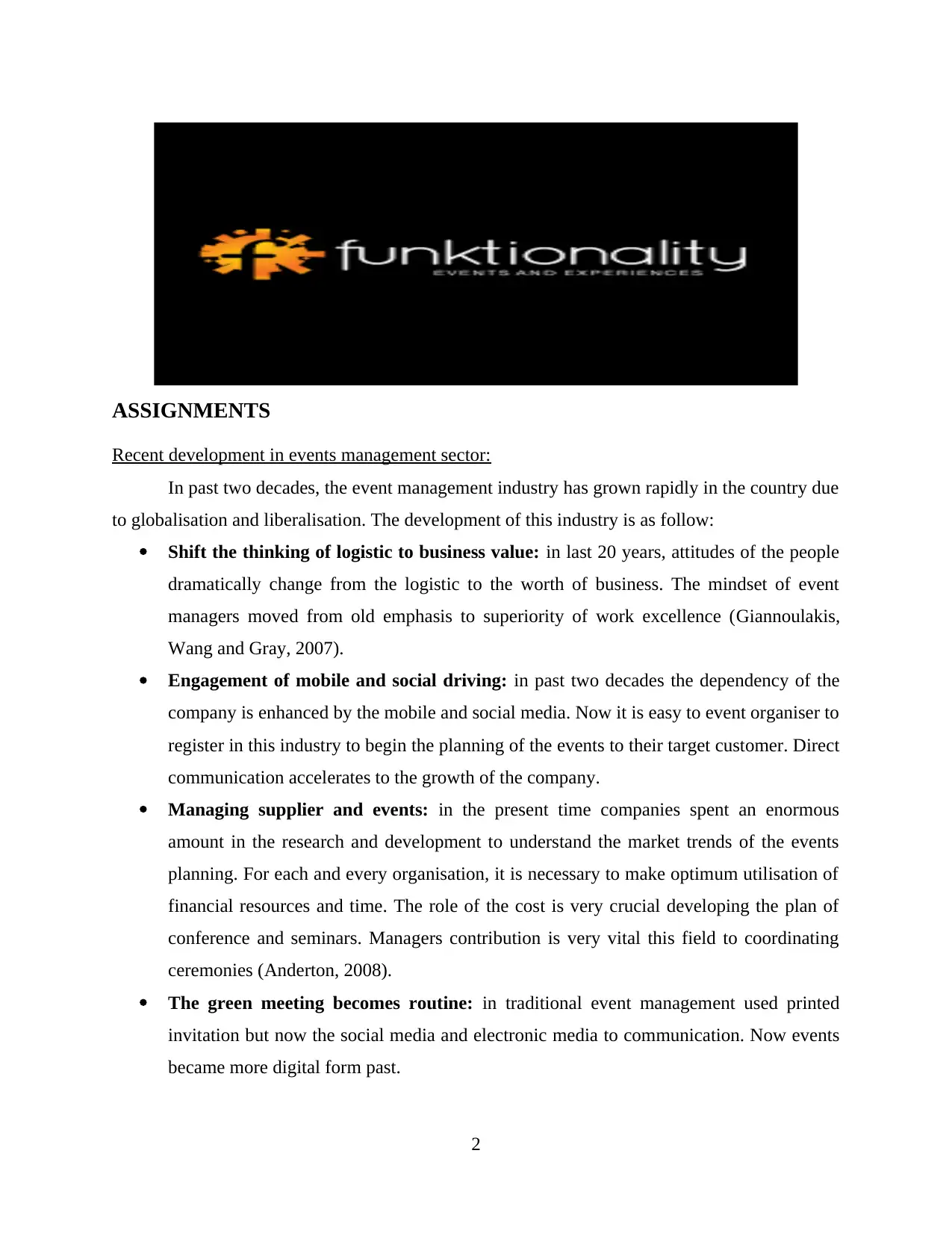
ASSIGNMENTS
Recent development in events management sector:
In past two decades, the event management industry has grown rapidly in the country due
to globalisation and liberalisation. The development of this industry is as follow:
Shift the thinking of logistic to business value: in last 20 years, attitudes of the people
dramatically change from the logistic to the worth of business. The mindset of event
managers moved from old emphasis to superiority of work excellence (Giannoulakis,
Wang and Gray, 2007).
Engagement of mobile and social driving: in past two decades the dependency of the
company is enhanced by the mobile and social media. Now it is easy to event organiser to
register in this industry to begin the planning of the events to their target customer. Direct
communication accelerates to the growth of the company.
Managing supplier and events: in the present time companies spent an enormous
amount in the research and development to understand the market trends of the events
planning. For each and every organisation, it is necessary to make optimum utilisation of
financial resources and time. The role of the cost is very crucial developing the plan of
conference and seminars. Managers contribution is very vital this field to coordinating
ceremonies (Anderton, 2008).
The green meeting becomes routine: in traditional event management used printed
invitation but now the social media and electronic media to communication. Now events
became more digital form past.
2
Recent development in events management sector:
In past two decades, the event management industry has grown rapidly in the country due
to globalisation and liberalisation. The development of this industry is as follow:
Shift the thinking of logistic to business value: in last 20 years, attitudes of the people
dramatically change from the logistic to the worth of business. The mindset of event
managers moved from old emphasis to superiority of work excellence (Giannoulakis,
Wang and Gray, 2007).
Engagement of mobile and social driving: in past two decades the dependency of the
company is enhanced by the mobile and social media. Now it is easy to event organiser to
register in this industry to begin the planning of the events to their target customer. Direct
communication accelerates to the growth of the company.
Managing supplier and events: in the present time companies spent an enormous
amount in the research and development to understand the market trends of the events
planning. For each and every organisation, it is necessary to make optimum utilisation of
financial resources and time. The role of the cost is very crucial developing the plan of
conference and seminars. Managers contribution is very vital this field to coordinating
ceremonies (Anderton, 2008).
The green meeting becomes routine: in traditional event management used printed
invitation but now the social media and electronic media to communication. Now events
became more digital form past.
2
Paraphrase This Document
Need a fresh take? Get an instant paraphrase of this document with our AI Paraphraser
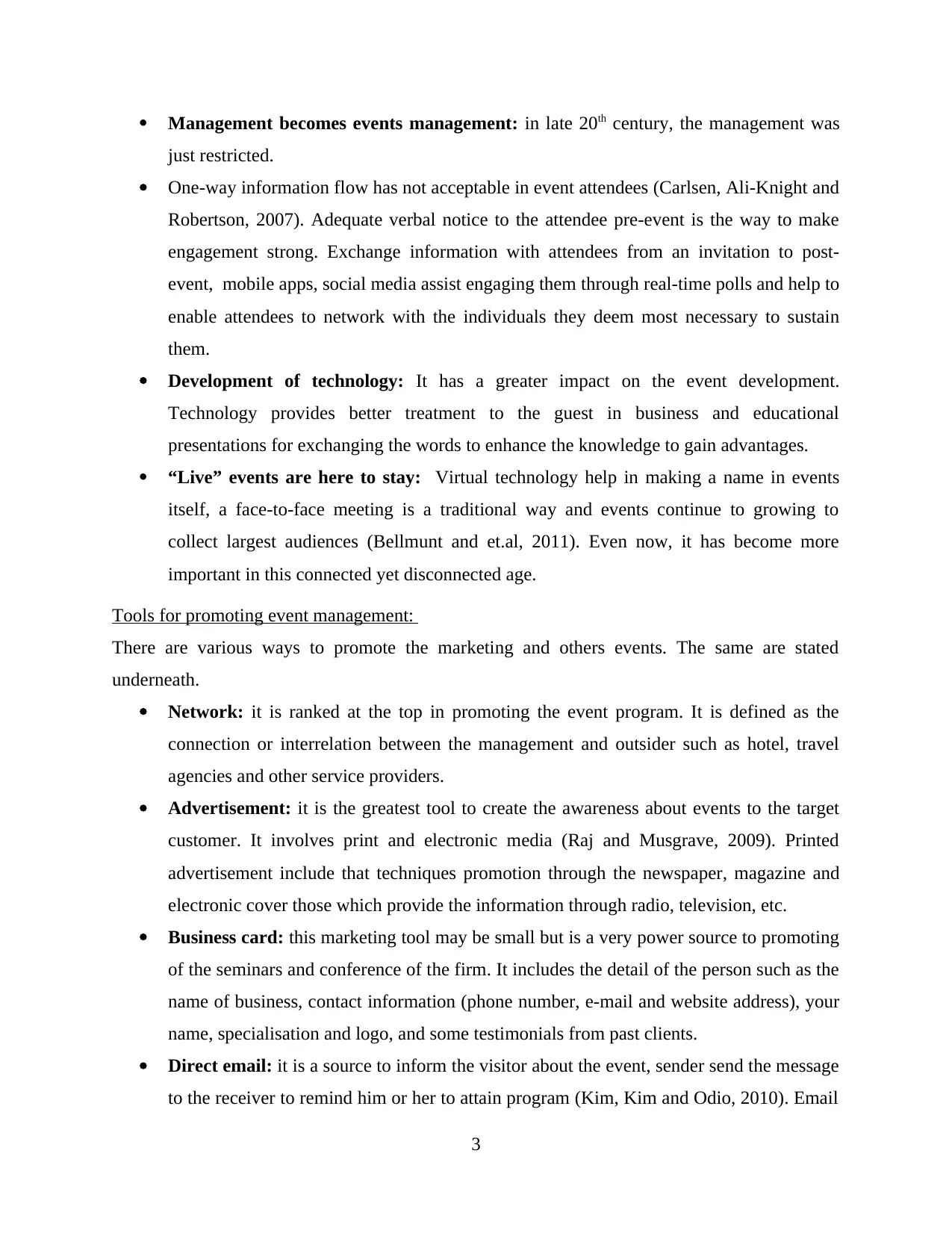
Management becomes events management: in late 20th century, the management was
just restricted.
One-way information flow has not acceptable in event attendees (Carlsen, Ali-Knight and
Robertson, 2007). Adequate verbal notice to the attendee pre-event is the way to make
engagement strong. Exchange information with attendees from an invitation to post-
event, mobile apps, social media assist engaging them through real-time polls and help to
enable attendees to network with the individuals they deem most necessary to sustain
them.
Development of technology: It has a greater impact on the event development.
Technology provides better treatment to the guest in business and educational
presentations for exchanging the words to enhance the knowledge to gain advantages.
“Live” events are here to stay: Virtual technology help in making a name in events
itself, a face-to-face meeting is a traditional way and events continue to growing to
collect largest audiences (Bellmunt and et.al, 2011). Even now, it has become more
important in this connected yet disconnected age.
Tools for promoting event management:
There are various ways to promote the marketing and others events. The same are stated
underneath.
Network: it is ranked at the top in promoting the event program. It is defined as the
connection or interrelation between the management and outsider such as hotel, travel
agencies and other service providers.
Advertisement: it is the greatest tool to create the awareness about events to the target
customer. It involves print and electronic media (Raj and Musgrave, 2009). Printed
advertisement include that techniques promotion through the newspaper, magazine and
electronic cover those which provide the information through radio, television, etc.
Business card: this marketing tool may be small but is a very power source to promoting
of the seminars and conference of the firm. It includes the detail of the person such as the
name of business, contact information (phone number, e-mail and website address), your
name, specialisation and logo, and some testimonials from past clients.
Direct email: it is a source to inform the visitor about the event, sender send the message
to the receiver to remind him or her to attain program (Kim, Kim and Odio, 2010). Email
3
just restricted.
One-way information flow has not acceptable in event attendees (Carlsen, Ali-Knight and
Robertson, 2007). Adequate verbal notice to the attendee pre-event is the way to make
engagement strong. Exchange information with attendees from an invitation to post-
event, mobile apps, social media assist engaging them through real-time polls and help to
enable attendees to network with the individuals they deem most necessary to sustain
them.
Development of technology: It has a greater impact on the event development.
Technology provides better treatment to the guest in business and educational
presentations for exchanging the words to enhance the knowledge to gain advantages.
“Live” events are here to stay: Virtual technology help in making a name in events
itself, a face-to-face meeting is a traditional way and events continue to growing to
collect largest audiences (Bellmunt and et.al, 2011). Even now, it has become more
important in this connected yet disconnected age.
Tools for promoting event management:
There are various ways to promote the marketing and others events. The same are stated
underneath.
Network: it is ranked at the top in promoting the event program. It is defined as the
connection or interrelation between the management and outsider such as hotel, travel
agencies and other service providers.
Advertisement: it is the greatest tool to create the awareness about events to the target
customer. It involves print and electronic media (Raj and Musgrave, 2009). Printed
advertisement include that techniques promotion through the newspaper, magazine and
electronic cover those which provide the information through radio, television, etc.
Business card: this marketing tool may be small but is a very power source to promoting
of the seminars and conference of the firm. It includes the detail of the person such as the
name of business, contact information (phone number, e-mail and website address), your
name, specialisation and logo, and some testimonials from past clients.
Direct email: it is a source to inform the visitor about the event, sender send the message
to the receiver to remind him or her to attain program (Kim, Kim and Odio, 2010). Email
3
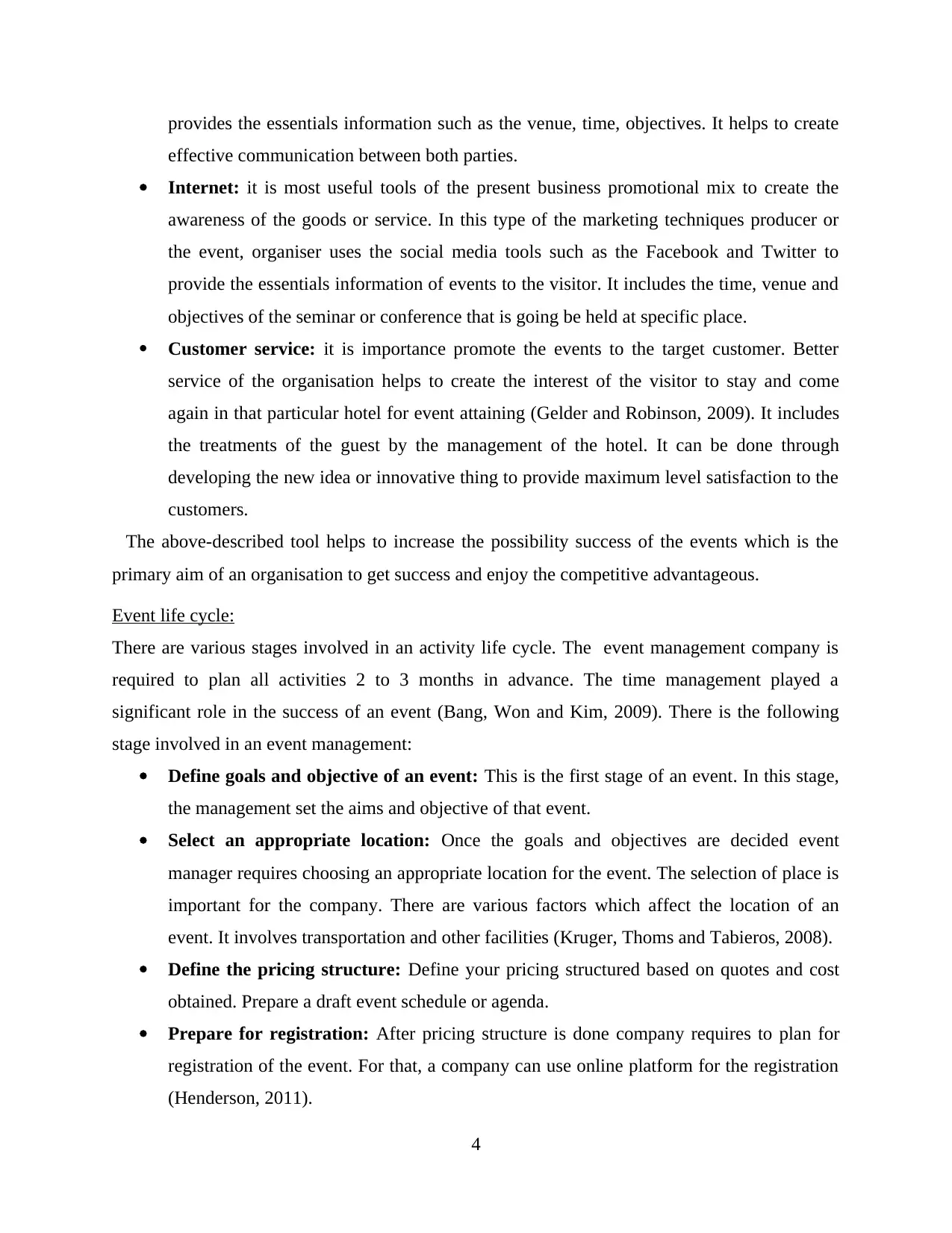
provides the essentials information such as the venue, time, objectives. It helps to create
effective communication between both parties.
Internet: it is most useful tools of the present business promotional mix to create the
awareness of the goods or service. In this type of the marketing techniques producer or
the event, organiser uses the social media tools such as the Facebook and Twitter to
provide the essentials information of events to the visitor. It includes the time, venue and
objectives of the seminar or conference that is going be held at specific place.
Customer service: it is importance promote the events to the target customer. Better
service of the organisation helps to create the interest of the visitor to stay and come
again in that particular hotel for event attaining (Gelder and Robinson, 2009). It includes
the treatments of the guest by the management of the hotel. It can be done through
developing the new idea or innovative thing to provide maximum level satisfaction to the
customers.
The above-described tool helps to increase the possibility success of the events which is the
primary aim of an organisation to get success and enjoy the competitive advantageous.
Event life cycle:
There are various stages involved in an activity life cycle. The event management company is
required to plan all activities 2 to 3 months in advance. The time management played a
significant role in the success of an event (Bang, Won and Kim, 2009). There is the following
stage involved in an event management:
Define goals and objective of an event: This is the first stage of an event. In this stage,
the management set the aims and objective of that event.
Select an appropriate location: Once the goals and objectives are decided event
manager requires choosing an appropriate location for the event. The selection of place is
important for the company. There are various factors which affect the location of an
event. It involves transportation and other facilities (Kruger, Thoms and Tabieros, 2008).
Define the pricing structure: Define your pricing structured based on quotes and cost
obtained. Prepare a draft event schedule or agenda.
Prepare for registration: After pricing structure is done company requires to plan for
registration of the event. For that, a company can use online platform for the registration
(Henderson, 2011).
4
effective communication between both parties.
Internet: it is most useful tools of the present business promotional mix to create the
awareness of the goods or service. In this type of the marketing techniques producer or
the event, organiser uses the social media tools such as the Facebook and Twitter to
provide the essentials information of events to the visitor. It includes the time, venue and
objectives of the seminar or conference that is going be held at specific place.
Customer service: it is importance promote the events to the target customer. Better
service of the organisation helps to create the interest of the visitor to stay and come
again in that particular hotel for event attaining (Gelder and Robinson, 2009). It includes
the treatments of the guest by the management of the hotel. It can be done through
developing the new idea or innovative thing to provide maximum level satisfaction to the
customers.
The above-described tool helps to increase the possibility success of the events which is the
primary aim of an organisation to get success and enjoy the competitive advantageous.
Event life cycle:
There are various stages involved in an activity life cycle. The event management company is
required to plan all activities 2 to 3 months in advance. The time management played a
significant role in the success of an event (Bang, Won and Kim, 2009). There is the following
stage involved in an event management:
Define goals and objective of an event: This is the first stage of an event. In this stage,
the management set the aims and objective of that event.
Select an appropriate location: Once the goals and objectives are decided event
manager requires choosing an appropriate location for the event. The selection of place is
important for the company. There are various factors which affect the location of an
event. It involves transportation and other facilities (Kruger, Thoms and Tabieros, 2008).
Define the pricing structure: Define your pricing structured based on quotes and cost
obtained. Prepare a draft event schedule or agenda.
Prepare for registration: After pricing structure is done company requires to plan for
registration of the event. For that, a company can use online platform for the registration
(Henderson, 2011).
4
⊘ This is a preview!⊘
Do you want full access?
Subscribe today to unlock all pages.

Trusted by 1+ million students worldwide
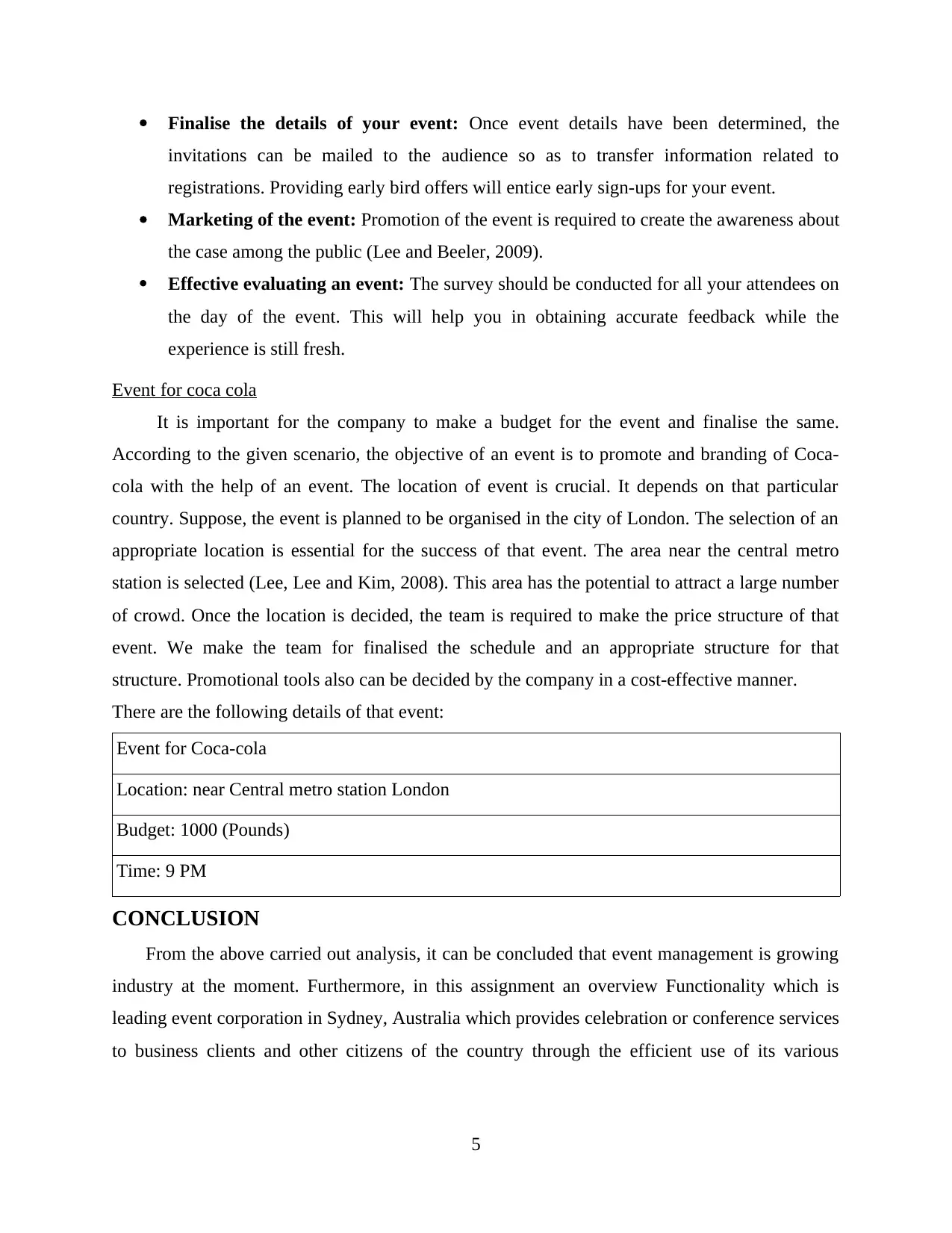
Finalise the details of your event: Once event details have been determined, the
invitations can be mailed to the audience so as to transfer information related to
registrations. Providing early bird offers will entice early sign-ups for your event.
Marketing of the event: Promotion of the event is required to create the awareness about
the case among the public (Lee and Beeler, 2009).
Effective evaluating an event: The survey should be conducted for all your attendees on
the day of the event. This will help you in obtaining accurate feedback while the
experience is still fresh.
Event for coca cola
It is important for the company to make a budget for the event and finalise the same.
According to the given scenario, the objective of an event is to promote and branding of Coca-
cola with the help of an event. The location of event is crucial. It depends on that particular
country. Suppose, the event is planned to be organised in the city of London. The selection of an
appropriate location is essential for the success of that event. The area near the central metro
station is selected (Lee, Lee and Kim, 2008). This area has the potential to attract a large number
of crowd. Once the location is decided, the team is required to make the price structure of that
event. We make the team for finalised the schedule and an appropriate structure for that
structure. Promotional tools also can be decided by the company in a cost-effective manner.
There are the following details of that event:
Event for Coca-cola
Location: near Central metro station London
Budget: 1000 (Pounds)
Time: 9 PM
CONCLUSION
From the above carried out analysis, it can be concluded that event management is growing
industry at the moment. Furthermore, in this assignment an overview Functionality which is
leading event corporation in Sydney, Australia which provides celebration or conference services
to business clients and other citizens of the country through the efficient use of its various
5
invitations can be mailed to the audience so as to transfer information related to
registrations. Providing early bird offers will entice early sign-ups for your event.
Marketing of the event: Promotion of the event is required to create the awareness about
the case among the public (Lee and Beeler, 2009).
Effective evaluating an event: The survey should be conducted for all your attendees on
the day of the event. This will help you in obtaining accurate feedback while the
experience is still fresh.
Event for coca cola
It is important for the company to make a budget for the event and finalise the same.
According to the given scenario, the objective of an event is to promote and branding of Coca-
cola with the help of an event. The location of event is crucial. It depends on that particular
country. Suppose, the event is planned to be organised in the city of London. The selection of an
appropriate location is essential for the success of that event. The area near the central metro
station is selected (Lee, Lee and Kim, 2008). This area has the potential to attract a large number
of crowd. Once the location is decided, the team is required to make the price structure of that
event. We make the team for finalised the schedule and an appropriate structure for that
structure. Promotional tools also can be decided by the company in a cost-effective manner.
There are the following details of that event:
Event for Coca-cola
Location: near Central metro station London
Budget: 1000 (Pounds)
Time: 9 PM
CONCLUSION
From the above carried out analysis, it can be concluded that event management is growing
industry at the moment. Furthermore, in this assignment an overview Functionality which is
leading event corporation in Sydney, Australia which provides celebration or conference services
to business clients and other citizens of the country through the efficient use of its various
5
Paraphrase This Document
Need a fresh take? Get an instant paraphrase of this document with our AI Paraphraser
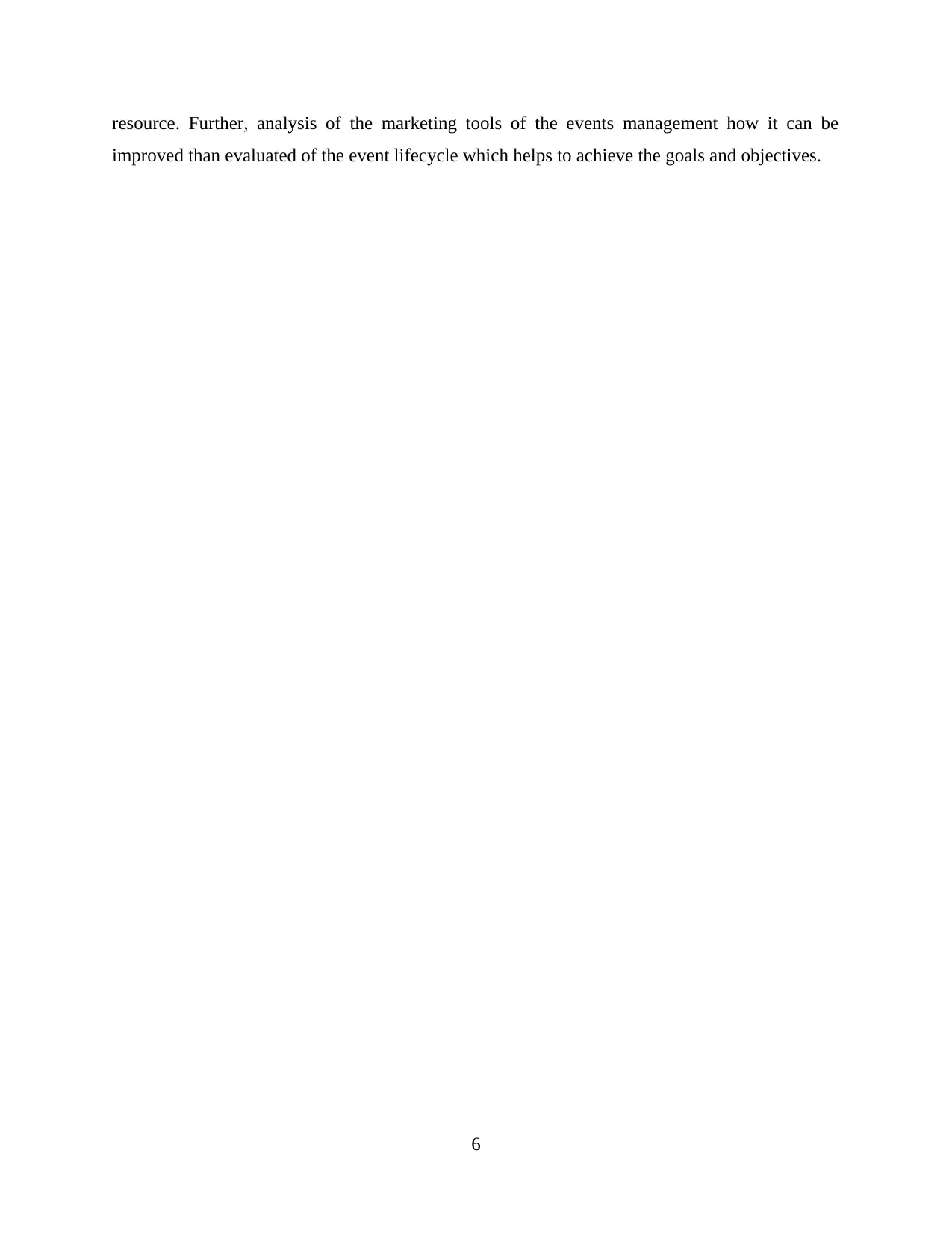
resource. Further, analysis of the marketing tools of the events management how it can be
improved than evaluated of the event lifecycle which helps to achieve the goals and objectives.
6
improved than evaluated of the event lifecycle which helps to achieve the goals and objectives.
6
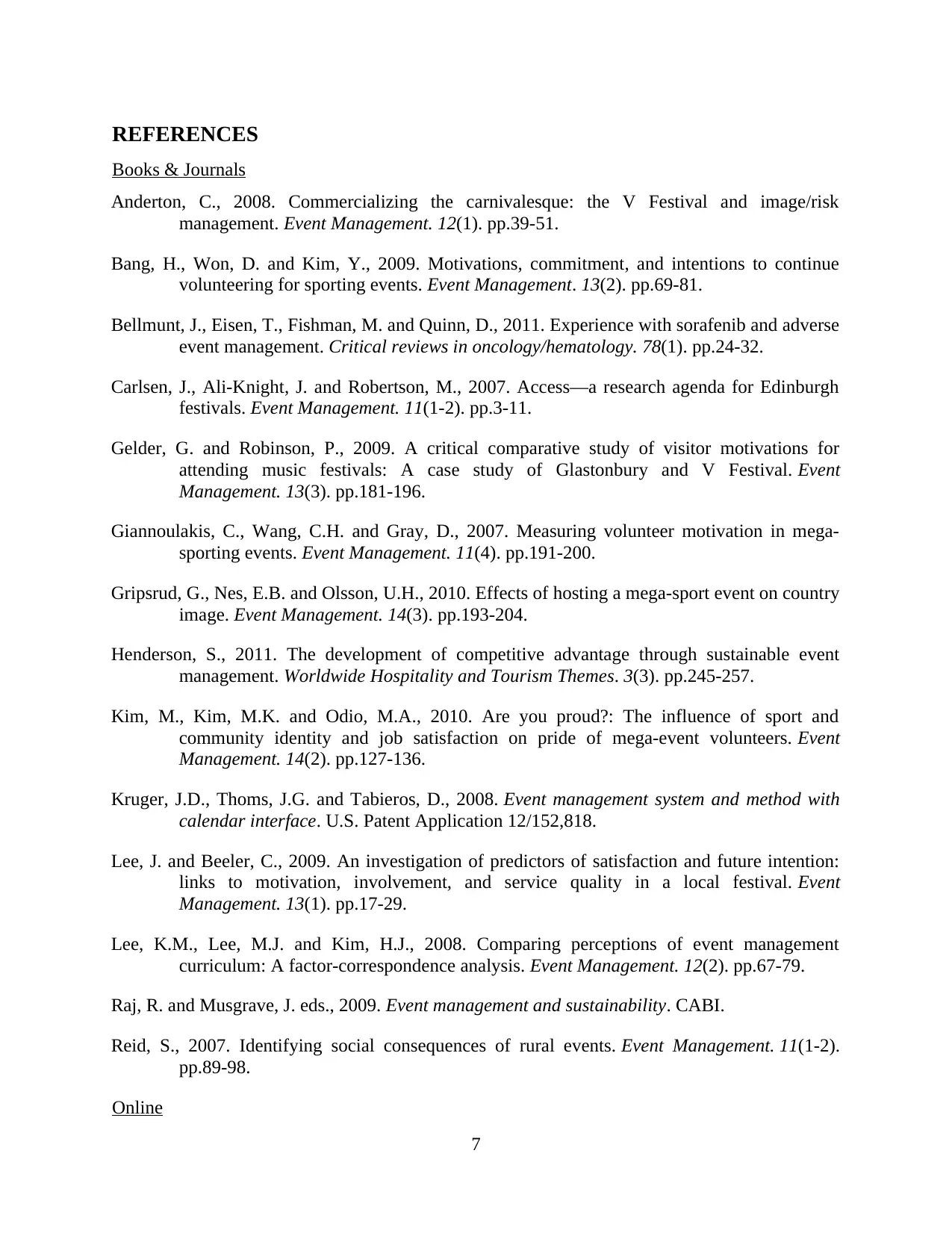
REFERENCES
Books & Journals
Anderton, C., 2008. Commercializing the carnivalesque: the V Festival and image/risk
management. Event Management. 12(1). pp.39-51.
Bang, H., Won, D. and Kim, Y., 2009. Motivations, commitment, and intentions to continue
volunteering for sporting events. Event Management. 13(2). pp.69-81.
Bellmunt, J., Eisen, T., Fishman, M. and Quinn, D., 2011. Experience with sorafenib and adverse
event management. Critical reviews in oncology/hematology. 78(1). pp.24-32.
Carlsen, J., Ali-Knight, J. and Robertson, M., 2007. Access—a research agenda for Edinburgh
festivals. Event Management. 11(1-2). pp.3-11.
Gelder, G. and Robinson, P., 2009. A critical comparative study of visitor motivations for
attending music festivals: A case study of Glastonbury and V Festival. Event
Management. 13(3). pp.181-196.
Giannoulakis, C., Wang, C.H. and Gray, D., 2007. Measuring volunteer motivation in mega-
sporting events. Event Management. 11(4). pp.191-200.
Gripsrud, G., Nes, E.B. and Olsson, U.H., 2010. Effects of hosting a mega-sport event on country
image. Event Management. 14(3). pp.193-204.
Henderson, S., 2011. The development of competitive advantage through sustainable event
management. Worldwide Hospitality and Tourism Themes. 3(3). pp.245-257.
Kim, M., Kim, M.K. and Odio, M.A., 2010. Are you proud?: The influence of sport and
community identity and job satisfaction on pride of mega-event volunteers. Event
Management. 14(2). pp.127-136.
Kruger, J.D., Thoms, J.G. and Tabieros, D., 2008. Event management system and method with
calendar interface. U.S. Patent Application 12/152,818.
Lee, J. and Beeler, C., 2009. An investigation of predictors of satisfaction and future intention:
links to motivation, involvement, and service quality in a local festival. Event
Management. 13(1). pp.17-29.
Lee, K.M., Lee, M.J. and Kim, H.J., 2008. Comparing perceptions of event management
curriculum: A factor-correspondence analysis. Event Management. 12(2). pp.67-79.
Raj, R. and Musgrave, J. eds., 2009. Event management and sustainability. CABI.
Reid, S., 2007. Identifying social consequences of rural events. Event Management. 11(1-2).
pp.89-98.
Online
7
Books & Journals
Anderton, C., 2008. Commercializing the carnivalesque: the V Festival and image/risk
management. Event Management. 12(1). pp.39-51.
Bang, H., Won, D. and Kim, Y., 2009. Motivations, commitment, and intentions to continue
volunteering for sporting events. Event Management. 13(2). pp.69-81.
Bellmunt, J., Eisen, T., Fishman, M. and Quinn, D., 2011. Experience with sorafenib and adverse
event management. Critical reviews in oncology/hematology. 78(1). pp.24-32.
Carlsen, J., Ali-Knight, J. and Robertson, M., 2007. Access—a research agenda for Edinburgh
festivals. Event Management. 11(1-2). pp.3-11.
Gelder, G. and Robinson, P., 2009. A critical comparative study of visitor motivations for
attending music festivals: A case study of Glastonbury and V Festival. Event
Management. 13(3). pp.181-196.
Giannoulakis, C., Wang, C.H. and Gray, D., 2007. Measuring volunteer motivation in mega-
sporting events. Event Management. 11(4). pp.191-200.
Gripsrud, G., Nes, E.B. and Olsson, U.H., 2010. Effects of hosting a mega-sport event on country
image. Event Management. 14(3). pp.193-204.
Henderson, S., 2011. The development of competitive advantage through sustainable event
management. Worldwide Hospitality and Tourism Themes. 3(3). pp.245-257.
Kim, M., Kim, M.K. and Odio, M.A., 2010. Are you proud?: The influence of sport and
community identity and job satisfaction on pride of mega-event volunteers. Event
Management. 14(2). pp.127-136.
Kruger, J.D., Thoms, J.G. and Tabieros, D., 2008. Event management system and method with
calendar interface. U.S. Patent Application 12/152,818.
Lee, J. and Beeler, C., 2009. An investigation of predictors of satisfaction and future intention:
links to motivation, involvement, and service quality in a local festival. Event
Management. 13(1). pp.17-29.
Lee, K.M., Lee, M.J. and Kim, H.J., 2008. Comparing perceptions of event management
curriculum: A factor-correspondence analysis. Event Management. 12(2). pp.67-79.
Raj, R. and Musgrave, J. eds., 2009. Event management and sustainability. CABI.
Reid, S., 2007. Identifying social consequences of rural events. Event Management. 11(1-2).
pp.89-98.
Online
7
⊘ This is a preview!⊘
Do you want full access?
Subscribe today to unlock all pages.

Trusted by 1+ million students worldwide
1 out of 9
Related Documents
Your All-in-One AI-Powered Toolkit for Academic Success.
+13062052269
info@desklib.com
Available 24*7 on WhatsApp / Email
![[object Object]](/_next/static/media/star-bottom.7253800d.svg)
Unlock your academic potential
Copyright © 2020–2025 A2Z Services. All Rights Reserved. Developed and managed by ZUCOL.





